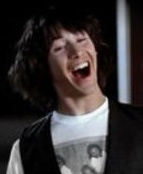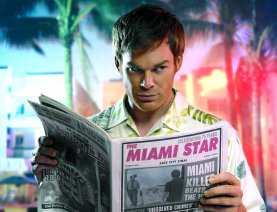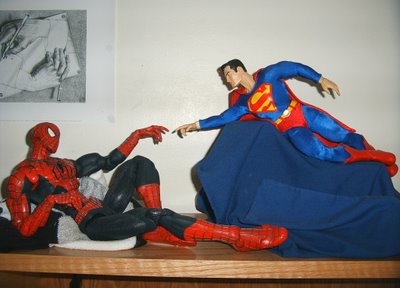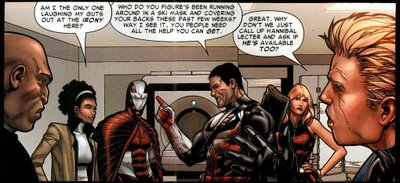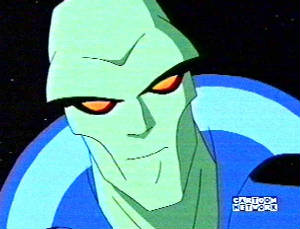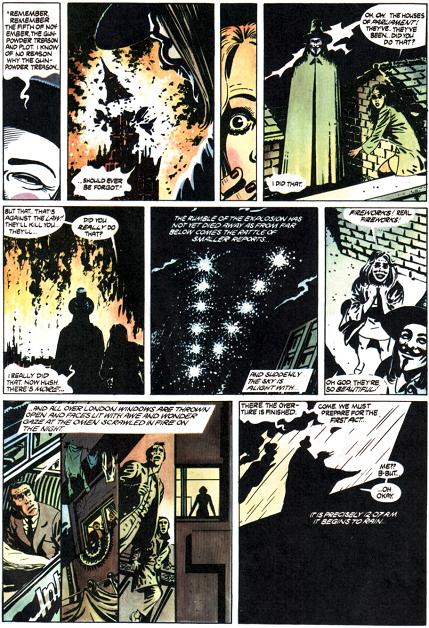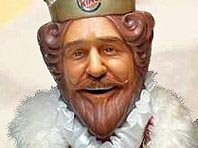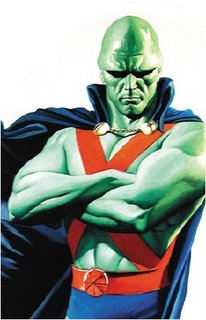
Okay, so it's not a "My ideal" post, but that's forthcoming. Most of my current ideas for J'onn are better suited for this sort of post anyway.
The folks in my
previous post on Mr. J'onzz had a lot of neat ideas, most of which revolved around stripping away most of J'onn's powers, or at least emphasizing them in a different way. Now, much as I think it'd be interesting to read about a ghostly grim detective-superhero who hunts criminals because their minds hurt him, that doesn't really jive with my impressions of Martian Manhunter (although it would make a really neat Spectre comic). When people talk about J'onn these days, there's really only one phrase that's consistent: J'onn J'onzz is the heart and soul of the JLA. The last MM series screwed up twice with this fact. First, it took him out of the JLA setting, but then it only really used superheroes for his supporting cast. It had the brilliant idea of exploring his many disguises, all over the world, yet never really developed any supporting cast in any of those places. It talked about J'onn's pre-Modern Age superheroic career, but never really did anything with it (despite the way it intimately connected him to the DEO and Cameron Chase). It tried to give him a rogues' gallery, but after goofy missteps like Bette Noire and Antares, it mainly just stuck to Justice League villains. It went in-depth into Martian history, detailing the psychic plague that killed the Green Martians, the origins of the White Martians, and the connection between the Martians and the Saturnians, but...well, it was
boring.
Really boring.
So we've seen the mistakes that previous series made: bad Rogues' Gallery, supporting cast of superheroes, overfocus on alien heritage...basically, all things that fail to make the character human and relatable. All things that the current series has in spades. So, it seems to me that the best thing to do would be to do pretty much the opposite, but to do it in a way that retains J'onn J'onzz as a character.
First, we strip down his backstory to the essentials, and we can blame it on a Superboy punch. Without doubt, the best Martian Manhunter has ever been was in the JLA animated series, and in
New Frontier. So let's take some cues from that, shall we?
J'onn J'onzz was a Manhunter on Mars, which was essentially their equivalent of a police officer. Due to the nature of Martian society, however, this meant mostly keeping the White Martians and alien visitors in check; the peace-loving Green Martians rarely broke the law or caused disturbances. The telepathic Martians were all connected mentally, all thoughts shared in a public mental network; only when they sought privacy did Martians cut themselves off from the collective, and then they usually still maintained connections with their family, or only cut themselves off for short periods of time. Martians were not used to silence. Martians each had a "public" form and a "private" form, as detailed in the last series, and lovers merged their forms, connecting both on a psychic and physical level; this could be sexual or merely comforting, depending on the relationship between the participants.
Eventually, a plague struck the Green Martian population, spreading through the merging that was normal to Martian life. J'onn cut himself off from the collective as H'ronmeer's Curse consumed the Martian race in mental and physical fire. He hoped to save his family from death, he tried to find a cure, but his daughter K'hym became infected at school. He chose to cut himself off from his family, while his wife M'yri'ah comforted the girl, and both were consumed in H'ronmeer's flames. J'onn watched Martian society collapse around him, until every last voice was silenced, and then he wandered the silent orb, performing funeral rites where he could, trying to find survivors. Days, weeks, years later--driven slightly mad from the silence, J'onn couldn't be sure--he was ripped from Ma'aleca'andra by Dr. Saul Erdel's transportation beam. The doctor suffered a fatal heart attack shortly after J'onn's arrival, but not before communicating to him a warning to stay away from fearful humans.
J'onn was lost, confused, lonely, and angry in this mid-1950s America, but there was one tiny bit of hope. He could hear it, a soft undercurrent of mental activity, like a half-tuned distant radio station. The people of Earth were not telepathic, but he could still hear them, he could still hear more than the silence, and it was slightly comforting to the alien.
J'onn lived in Erdel's laboratory, educating himself on human society by telepathically learning their language and watching television. He left the place invisibly on a few occasions in those early days, trying to observe these strange humans in their natural habitat. Martians knew of life on this world, but were forbidden from interfering with it after the great crime of the White Martians. As such, he had given humans little thought. After a week or so, the police came, responding to concerns about Dr. Erdel's sudden diappearance. J'onn hid, but among the officers who discovered the scientist's body, he could hear something, a voice slightly louder than the rest, standing up in the undercurrent. Denver Police Officer John Jones, barely more than a cadet, who had a difficult time keeping his lunch down when he saw the body, was very slightly telepathic, though he likely did not know it. J'onn was intrigued, and so he shadowed the officer.
Several years passed; John rose through the ranks to become a detected, unknowingly assisted by his own latent telepathy and his invisible alien companion. J'onn felt a kinship with this man, another officer of the law, and while he had initially latched onto him for some remnant of the companionship of his people, while he had tried to remain aloof and separate out of fear of being hurt emotionally, he had really grown to care for Jones. So, when an unexpected ambush left John Jones dying in J'onn's arms, the Martian took his form to continue the investigation and bring his would-be killers to justice. He continued in the John Jones form for years, gaining a reputation for being efficient and insightful, but also cold and humorless. He tried to keep himself from getting too close to anyone emotionally; everyone he'd been close to had died, and he was afraid of losing anyone else. He worked as a police officer up until he found himself falling in love with his new partner. He could not bring himself to make that jump again, and so he finally laid John Jones to rest.
After this, he bounced around from identity to identity, keeping himself moving so he could not develop deep emotional connections with humans. This lasted until Superman appeared, and he saw that humans could accept aliens. So, J'onn became the Martian Manhunter, and was an instrumental figure in starting the JLA.
And things here proceed much the way we know them. The Justice League gave J'onn a family, something he had not had since leaving Mars. Moreover, he did not have the same worries about this family; they were not vulnerable the way that his other families had been. Finally, after decades on Earth, J'onn J'onzz began to loosen up. He gained friends, felt a new connection to humanity, and developed a deep love for a certain sort of cookie. Through all the incarnations of the JLA, all the ups and downs, J'onn stuck with it. Initially, it was out of fear and co-dependence; J'onn felt that he needed the League, but eventually as he became stronger emotionally, as he developed, it became the League that needed him.
So, that's quite the backstory, but you wouldn't need to know that. You'd just need to know that J'onn is a Martian, a family man, and despite being a fantastic detective and one of the most powerful beings on the planet, he can still be overcome by the tiniest flame. His fear of fire has shifted back and forth over the decades, and recently it has tilted back toward physical rather than mental. Fire is once again his kryptonite, and not his phobia.
So, that brings us up to the current day. J'onn has taken some time away from the League, away from his pervious identities, and away from Martian matters, in order to forge the bond with humanity that for so long he avoided. He has now had the experience of decades of human contact and many human friendships, and feels comfortable opening up to the people of Earth in a way he never has before. John Jones strolls into the sunny Los Angeles suburb of Forest Bay and settles down in a cozy little subdivision, opening up a private detective agency in the city.
Why L.A.? Because there ought to be more west coast superheroes, and because it takes J'onn away from the JLA and mainstream DCU heroes, while still keeping him in range of the DEO and that source of conflict (need I remind you that a different Manhunter operates out of L.A.? And that she's good friends with one Cameron Chase?). Besides that, suburbia, as far as J'onn thinks, is a far better way to connect with humanity. After all, he'll get to know his neighbors, rather than just being in a sea of anonymous people. He's wrong, of course, but that's what happens when your only exposure to suburban life is 1950s television.
There's more to it, naturally. J'onn was drawn to Forest Bay, feeling a malevolent alien presence there. His job on Mars included keeping the alien population under control, and old habits die hard. When a routine surveillance of an unfaithful husband turns up a Lovecraftian cult trying to bring an alien god into our dimension, it suddenly becomes apparent to J'onn that there's more to the suburbs than meets the eye.
The plot and cast ought to be pretty straightforward, in a way. I see it as part sitcom, part Silver Age superhero madness, part "Men in Black." Among the people in the neighborhood are a team of undercover DEO agents masquerading as a slightly-too-normal family, the alien cult of J'lss'wrz the Unfathomable, a small but active chapter of a certain gentlemen's club with unconventional views about race and the flammability of crosses, and John's next door neighbor, a single mother trying to raise two normal children (one of whom is half-Daxamite). John immediately runs into conflict with the LAPD and the FBPD; he ends up with a somewhat-unwanted partner/Girl Friday; and he discovers a district of L.A. populated by displaced aliens trying to get by on Earth, a district which exists under the strict scrutiny of the DEO, which brings J'onn into conflict with them. Being one of the few black people in the suburban community raises a few unwanted conflicts as well, and teaches J'onn a little bit about the uglier side of human nature. He joins a support group for people who are the last survivors of their respective homeworlds, a tongue-in-cheek poke at the sheer number of "last sons" floating around the DCU (Maxima, the Omega Men, J'onn, Superman & Supergirl, Fatality, Guy Gardner). He quickly discovers a fundamental truth about humanity: everyone has secrets, and people are never quite what they appear to be on the surface.
And occasionally, we'd have a done-in-one flashback to some of the J'onn's adventures in the old days, as he sought something to remind him of home and family. Like when he found faith healers in 1960s Argentina using technology from an ancient White Martian outpost to work their miracles (with disastrous results), or when the Justice Experience fought their Earth-2 doppelgangers, or when he masqueraded as a farmhand in a small Kansas town, in hopes of finding proof of an alien spacecraft that may have crashed there years before.
So we have Choco-munching detective/superhero John Jones, trying to get in touch with his human side in suburbia, and to find closure to his life on Mars. Meanwhile, he finds himself surrounded with alien weirdness, human secrecy, and more than a little supervillainy, and tries to find his place in all of it. It pays homage to his long history in the DCU, explores the conflict between his human and alien natures, and leaves plenty of room for detective work and superheroic action. Doesn't that sound a little more like J'onn J'onzz than "brooding leader of angry Martian refugees"? Sure, it's stealing a little from Shadowpact and X-Factor, but those are good, fun comics for a reason. And hopefully the dissonant combination of aliens, secret societies, superheroics, and suburbia would make for a fun, interesting comic.
And I'd write it for free.
 I never want to type again.
I never want to type again. 

